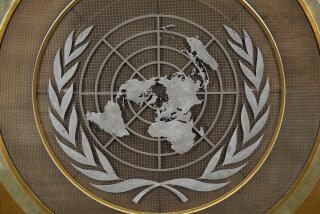UNITED NATIONS : With Rent Overdue, Bills Unpaid, Deadbeat Diplomats Get Scolding
- Share via
UNITED NATIONS — Secretary General Boutros Boutros-Ghali is upset with deadbeat diplomats at the United Nations, who owe more than $7 million to landlords, banks, hospitals, hotels, service stations and other creditors in the New York area.
The embarrassing situation not only angers creditors, he says, but it handicaps other diplomats seeking apartments, medical care and other services.
Not much can be done about the problem aside from scolding. Various forms of diplomatic immunity make it difficult for creditors to put their hands on the money owed them.
In a report to the General Assembly, Boutros-Ghali said 32 of the 185 U.N. members are responsible for the indebtedness. Five of them account for almost $6 million of the total owed. But the problem gets worse every year. Total indebtedness has increased almost sixfold from 1990 to 1994.
The secretary general did not identify the guilty countries. But the evidence points to Zaire, the Central African Republic, Liberia, Sierra Leone and Congo--all African countries in either economic or political turmoil--as the main offenders.
All Boutros-Ghali would say was that “in the most serious cases the excessive indebtedness of missions is attributable to and continues to persist as a result of the ongoing political and economic instability experienced by certain member states.”
*
Although almost all U.N. members have embassies in Washington, the problem of indebtedness is not as severe in the capital as in New York, according to a State Department official.
“In New York,” she said, “most missions lease property, whether for office space or residential purposes. Here in Washington a great many missions own their property, whether it’s the chancery or the ambassador’s residence. You have fewer rental leases in Washington, particularly for large amounts.”
Boutros-Ghali reported that Geneva, which hosts a number of U.N. agencies, also has many deadbeats among the 140 missions accredited there. He said 28 missions there owe a total of 5 million Swiss francs, or $4.25 million, mostly for rent, electricity, telephones and telecommunications. The figure could be higher, according to the United Nations, because a number of creditors have evidently not reported the debts to the Swiss government.
The U.S. government first brought the problem to the attention of the United Nations in 1973. But the situation got so bad last year, the secretary general reported, that U.S. Ambassador Madeleine Albright advised him that “the significant amount of diplomatic debt in New York had begun to tarnish the financial reputation of the United Nations community.”
*
Boutros-Ghali said one prominent bank, which he did not identify, had decided not to make any more loans to missions or diplomats.
“Some missions had not paid rent for two years or more,” the secretary general said, “and a number of residential landlords had either lost their property or were at risk of losing it because diplomatic tenants, who could not be evicted, would neither pay their rent nor leave the property.
“As a consequence,” he went on, “it was becoming more difficult for diplomats to obtain private leases in New York. The problem gave the entire diplomatic community a bad name.”
Although many diplomats are immune to criminal prosecution and civil lawsuits under international treaties, he said, they cannot claim this privilege on matters that do not pertain to their official work.
A U.S. official said, however, that this probably reflects the secretary general’s hope rather than reality.
In practice, the official said, it is difficult for creditors to win such lawsuits because diplomats often invoke immunity successfully.
In a few cases, Boutros-Ghali said, the U.S. government has expelled diplomats who had refused to pay extensive debts. Diplomats have suggested a number of other remedies, but the secretary general said most had not proven feasible.
Some have suggested creating a special fund of voluntary contributions to reimburse creditors.
Boutros-Ghali said the United Nations, which has no legal responsibility to take care of the debts of diplomats, could not run such a fund but that a private organization, such as the Business Council for the United Nations, might do so.
Past Due
The amount of money owed to landlords, banks, merchants and other creditors by U.N. missions in New York and their employees.
(In millions)
1990: $1.2
1991: $2.3
1992: $2.7
1993: $4.2
1994: $7
Source: United Nations
Worst Offenders
The United Nations did not officially reveal which countries owe the most but informed sources gave the following figures:
Zaire: $1.9 mil.*
Central African Rep.: $1.9 mil.*
Liberia: 1 mil.
Sierra Leone: $686,000
Congo: $310,000
* Approximate
More to Read
Sign up for Essential California
The most important California stories and recommendations in your inbox every morning.
You may occasionally receive promotional content from the Los Angeles Times.












